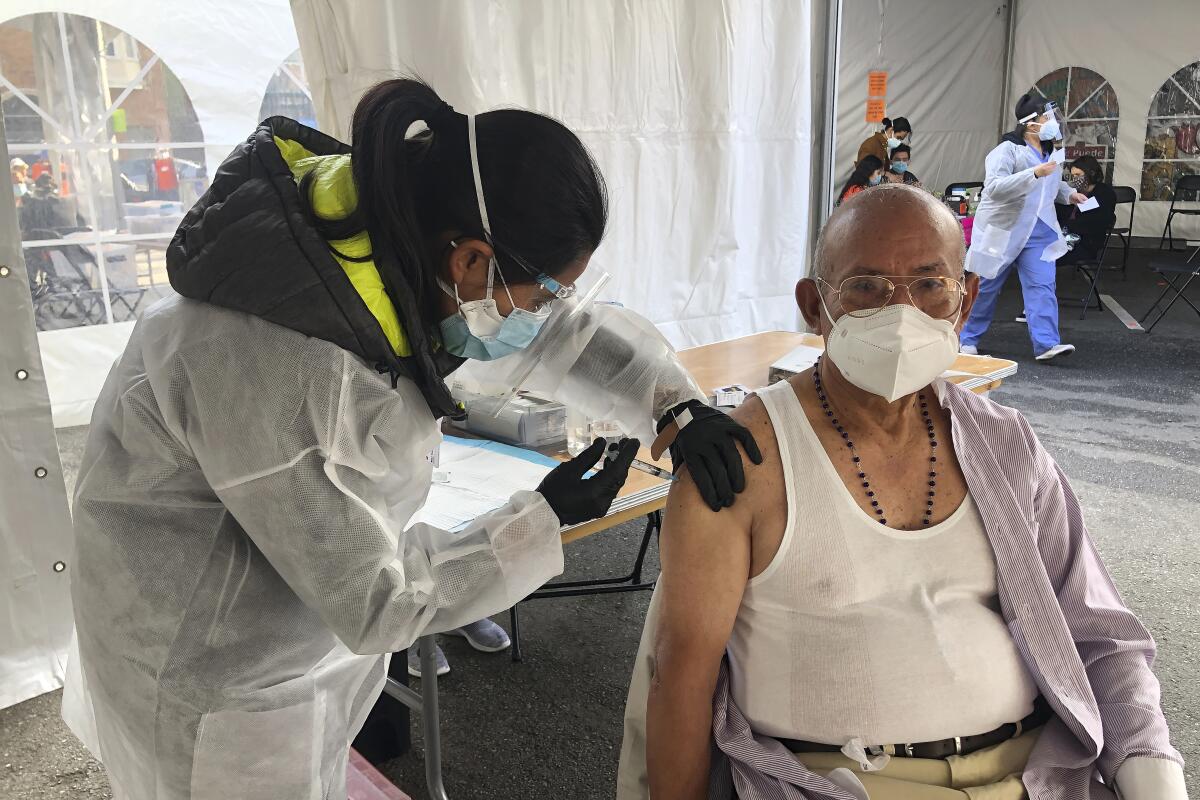Bay Area health officials urge employers to require workers to be vaccinated

- Share via
As COVID-19 case rates mount, Bay Area health officials are now asking private employers to take a larger role in countering the spread of the Delta variant by recommending that they begin requiring employees to be vaccinated.
Health officials in Contra Costa, Santa Clara and San Francisco counties at a Thursday briefing implored workplaces to get more involved. Public officials have not made such explicit recommendations before, but said the current outbreak requires aggressive action to boost vaccination rates.
“Unvaccinated workers pose a risk not only to themselves but also to their co-workers and the members of the public they interact with,” said Contra Costa County Health Officer Dr. Chris Farnitano. “Employers have an obligation to provide safe workplaces for their employees, and employees are also interested in ... working in a place that is safe and is not putting their health at risk.”
Vaccines have been available for over seven months, but the rate of vaccinations has stalled, just as the transmissible Delta variant has become the dominant strain of the coronavirus in the country. The nearly 62% of Californians who are vaccinated is not enough, officials say.
Other Bay Area government entities are tightening their COVID-19 requirements, too — Santa Clara County officials said they intended to soon require vaccines among county employees. Starting Monday in San Mateo County, everyone entering county facilities must wear masks, regardless of vaccination status.
“The increasing case numbers are a harsh reminder that we are not done with COVID and COVID is not done with us,” San Mateo County Manager Mike Callagy said in a statement. “Let’s all continue to do our part by getting vaccinated and taking common-sense precautions so we can keep all of us safe.”
COVID cases are rising predominantly among unvaccinated individuals. While breakthrough infections among vaccinated people do occur, they represent a tiny percentage of overall cases. Studies have shown that most of the vaccinated people who do contract COVID don’t have symptoms severe enough to require hospitalization.
Still, the new spread of COVID among unvaccinated individuals and soaring case numbers have prompted new stipulations for masking indoors and vaccine requirements across California.
Just a week ago Los Angeles County revived a law requiring masks indoors. Last month, San Francisco announced it would require all of its 35,000 municipal workers to get vaccinated, once one of the three shots available in the U.S. — Pfizer-BioNTech, Moderna or Johnson & Johnson — receives full federal approval. Each vaccine is currently being offered through the Food and Drug Administration’s emergency use authorization.
The University of California system also announced last week that it would require vaccines for all students, faculty and others for the fall term, and Pasadena soon followed suit for its city employees.
Mandating vaccines would be relatively new legal territory for private businesses. Kevin Troutman, a Houston-based attorney who leads the vaccine workgroup at the national employment law firm Fisher Phillips, told the San Diego Union-Tribune in April that the primary industries to require vaccinations are agriculture and food production, construction and healthcare.
But other industries have stepped up their requirements, too. Last month, Morgan Stanley announced it would prohibit unvaccinated people — including any of its thousands of employees — from visiting the bank’s New York offices. Also last month, a federal judge dismissed a lawsuit from several employees at a Houston hospital who sued over a mandatory vaccination policy.
Some have questioned the legality of employers requiring vaccines. Defenders point to a 1905 Supreme Court case, Jacobson vs. Massachusetts, in which the court decided a state law requiring vaccines against smallpox was constitutional. With their recommendation, Bay Area health officials sought to assure business leaders that they are on solid legal footing.
“What we really want to do is empower businesses with this recommendation and say that public health is fully behind these type of requirements,” San Francisco deputy director of health Naveena Bobba said. “Our businesses have suffered a lot over the last year and a half. And I do think that they are looking at how they can really make sure their businesses stay up and open, and that includes employee safety.”
Employers have a financial incentive for mandating the vaccine, said Farnitano, the Contra Costa health officer — the fewer employees who get COVID, the less time they’re away from work, quarantining.
If companies choose to require vaccines, Farnitano said, limited legal exceptions may be available for workers with certain medical or religious exemptions. He also said employers should collect documented proof of vaccinations, and strongly recommended they require medical-grade masks for unvaccinated people.
“We know COVID is not going away,” Farnitano said. “The choice now is either to get the vaccine or to get COVID and employers can play a big role in helping create COVID safe workplaces by promoting vaccination among their workforce.”
More to Read
Sign up for Essential California
The most important California stories and recommendations in your inbox every morning.
You may occasionally receive promotional content from the Los Angeles Times.











